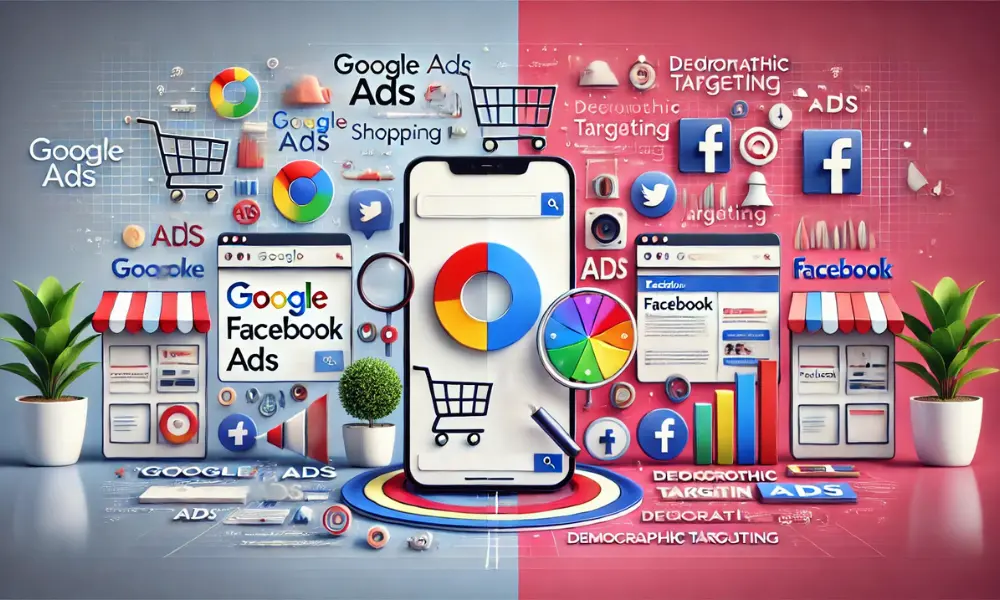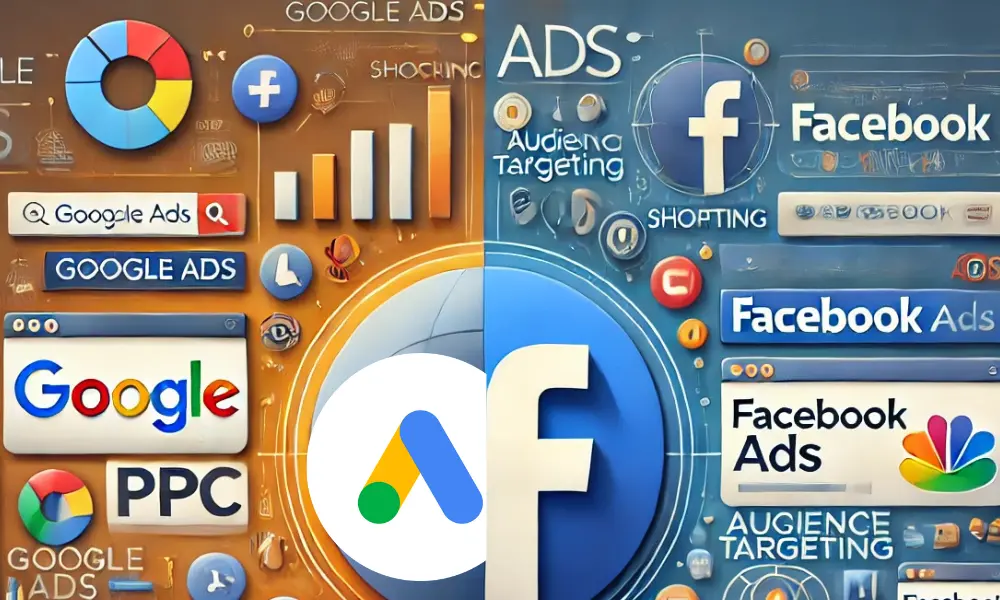Google Ads vs Facebook Ads are two of the most powerful digital advertising platforms, but each serves a unique purpose. While one focuses on search intent, the other thrives on audience behavior and social engagement. Picking the right platform can seem like choosing between two great tools—but the best choice depends on your business objectives. In this article, we’ll break down their key differences, pros, and cons to help you make an informed decision.
Table of Contents

What Are Google Ads and Facebook Ads?
Understanding Google Ads
This uses a pay-per-click (PPC) model and shows advertisements on YouTube, Google Search, and its Display Network. These ads are triggered by keywords and appear when users actively search for specific information, products, or services.
Understanding Facebook Ads
This focus on user behavior and are displayed across Facebook, Instagram, Messenger, and the Audience Network. These ads use demographic, interest-based, and behavioral targeting to engage audiences while they browse social media.
Key Differences
Targeting Approach
Google Ads: Targets users based on search intent and keywords. Users are actively looking for solutions, making Google Ads ideal for capturing high-quality leads.
Facebook Ads: Uses behavioral and demographic data to identify audiences. This approach excels at building awareness and engaging users who might not yet know they need your product.
Ad Placement
Google Ads: Ads appear on search results pages, YouTube, and websites in the Google Display Network.
Facebook Ads: Ads are shown in the Facebook and Instagram feeds, Stories, Reels, and Messenger.
Campaign Goals
Google Ads: Prioritizes conversions and clicks. It’s perfect for businesses focused on driving direct sales or lead generation.
Facebook Ads: Focuses on awareness, engagement, and brand loyalty, making it great for relationship building.
Speed of Results
Google Ads: Offers businesses that target people with specific intent instant results.
Facebook Ads: Requires time to optimize campaigns and retarget users for conversions.
Analytics and Optimization
Google Ads: Offers detailed insights through Google Analytics, enabling precise keyword and ad performance tracking.
Facebook Ads: Leverages pixel-based tracking to measure actions on websites and optimize future campaigns.
Ad Formats and Creativity
Google ads: Mostly text-based, but also contains video and shopping advertisements.
Facebook Ads: Highly visual, focusing on images, videos, carousels, and Stories to captivate audiences.
Cost and Competition
Google Ads: Higher costs due to keyword competition, especially in saturated markets.
Facebook Ads: Generally more affordable, especially for businesses with creative ad strategies.

Pros and Cons of Google Ads
Benefits
1. Capture High-Intent Leads: Users on Google are actively searching for solutions, leading to higher conversion rates.
2. Vast Reach: Google processes over 8.5 billion searches daily, ensuring unparalleled exposure.
3. Varied Ad Formats: From search ads to video and Shopping Ads, Google caters to diverse business needs.
4. Scalability: Suitable for both small businesses and large enterprises, depending on the budget.
Drawbacks
1. High Cost Per Click (CPC): Competitive industries, like legal and finance, often face steep costs.
2. Steep Learning Curve: Managing keywords, bidding, and optimizing campaigns requires expertise.
3. Limited Audience Engagement: Google Advertisement focuses on search intent and lacks the social engagement component that Facebook offers.
Pros and Cons of Facebook Ads
Benefits
1. Hyper-Specific Targeting: Facebook collects vast amounts of user data, allowing for precise targeting based on interests, behaviors, and demographics.
2. Cost-Effective: Great for businesses with smaller budgets, offering a lower cost per impression (CPM).
3. Creative Flexibility: Visually engaging formats like video ads, Stories, and carousels can drive high interaction.
4. Retargeting Opportunities: The Facebook Pixel makes it easy to re-engage past visitors and nurture leads.
Also Read- How to run google ads?
Drawbacks
1. Lower Intent: Users aren’t actively searching for solutions, which can lead to lower-quality leads.
2. Ad Fatigue: Frequent exposure to the same ads can lead to reduced engagement over time.
3. Data Privacy Concerns: iOS updates and stricter privacy regulations have limited Facebook’s tracking and targeting capabilities.
4. Performance Plateau: Over time, scaling campaigns on Facebook can become challenging without fresh creative ideas.
Choosing the Right Platform for Your Business
Budget Considerations
If you’re on a tight budget, Facebook Advertisement may be more cost-effective. However, Google Advertisement can provide a better ROI for businesses focused on immediate conversions.
Business Goals
Use Google Advertisement for driving direct sales or capturing high-intent leads. Choose Facebook Advertisement for building long-term brand awareness and fostering customer relationships.
Industry-Specific Fit
Google Advertisement: Works best for industries with strong search demand, such as legal services, healthcare, or home improvement.
Facebook Advertisement: Ideal for e-commerce brands, fashion, lifestyle, and businesses with visually appealing products.
You can utilize both platforms, so why limit yourself to just one?
Many businesses see success by combining Google advertisement intent-driven campaigns with Facebook Advertisement engagement-focused strategies. For instance, use Facebook Advertisement to build awareness and retarget users with Google Advertisement for conversions.
In the end, both of them have advantages and disadvantages. The right choice depends on your business goals, target audience, and budget. Google Advertisement excels at capturing high-intent leads, while Facebook Advertisement shines in building awareness and engagement. To maximize your results, consider integrating both platforms into a cohesive strategy.
FAQs
Can small businesses use both Google Ads and Facebook Ads?
Absolutely! Small businesses can leverage both platforms to target different stages of the customer journey.
Which platform is better for lead generation?
Google Advertisement is generally more effective for lead generation due to its intent-based targeting.
What’s the best platform for brand awareness?
Facebook Advertisement is the go-to option for building brand awareness through visual storytelling and social engagement.
How do I decide between these platforms?
Consider your goals, audience, and budget. Google Advertisement is best for immediate results, while Facebook Advertisement works well for nurturing relationships.
